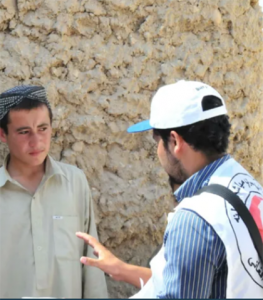What does the Taliban mean for aid agencies?
On the day after the Taliban swept into Kabul and cemented its control, international aid agencies were looking at how to restart their work in a country already locked in multiple humanitarian crises.
Humanitarian agencies say they have a mandate to continue emergency aid. But how that would happen is uncertain.
 The future depends on problematic negotiations with the Taliban, which in the past have included refusing to allow female aid staff, choosing where and to whom aid goes, and demanding payments for access.
The future depends on problematic negotiations with the Taliban, which in the past have included refusing to allow female aid staff, choosing where and to whom aid goes, and demanding payments for access.
The Taliban new policy on aid is still unclear.
Afghanistan’s upheaval comes as long-standing emergencies continue – they include mass displacement, a severe drought and another COVID-19 wave.
These crises have all been magnified during the Taliban’s recent military surge. Tens of thousands more people have fled their homes, with many of the displaced gathered in Kabul.
There are also fears for the treatment of women, minorities, and others persecuted under previous Taliban rule.
A July security assessment, used by aid agencies as a guide, predicted a stalemate and said the Taliban may not be able to take and hold provincial capitals.
The report came out as the Taliban was overrunning rural districts nominally controlled by the government.
The report had become redundant by the time the Taliban seized the major cities of Herat and Kandahar late last week.
Several aid agencies rushed plans to evacuate international workers, though some expatriate staff still remain. Just days earlier, some NGOs had been considering much smaller reductions.
Throughout the conflict, the message from the UN and humanitarian agencies has been to “stay and deliver” – a common refrain on maintaining aid in dangerous environments.
Some aid agencies have suspended most operations by are hoping to restart emergency relief when it is safe.
A UNICEF spokesperson told the BBC that the agency hoped to restart operations within days. Médecins Sans Frontières and Italian NGO Emergency, said their medical operations in parts of the country were still running.
Before the Taliban takeover, humanitarian agencies regularly worked in disputed or Taliban-controlled territories. Staff safety and independence hinges on often-sensitive negotiations with Taliban officials assigned to liaise with aid groups.
On Monday, those negotiations were yet to begin Kabul.
In other parts of Afghanistan, Taliban officials contacted NGOs soon after territories changed hands.
Aid groups mostly believe the Taliban is eager to get some types of emergency operations underway. But this varies depending on the location and the severity of recent fighting, they say.
But remains unclear whether the Taliban will take a harder line with aid groups, imposing restrictions – especially on women.
And for the Afghans who make the vast majority of aid staff, continuing to work means to do so in an emergency while their lives and country are in turmoil and their families possibly at risk.
Aid agencies say they’re trying to protect their staff.
Some have paid salaries in advance. Others are emphasising policies that allow staff to refuse assignments if they don’t feel safe.
The Taliban resurgence is just one more crisis in a country already facing multiple humanitarian emergencies.
The 2021 conflict has displaced hundreds of thousands of Afghans – many in recent weeks. And more than 700,000 people have been expelled and forced home from neighbouring Iran.
A severe drought has meant warnings of hunger this winter and a third COVID-19 wave has decimated an already struggling health system.












